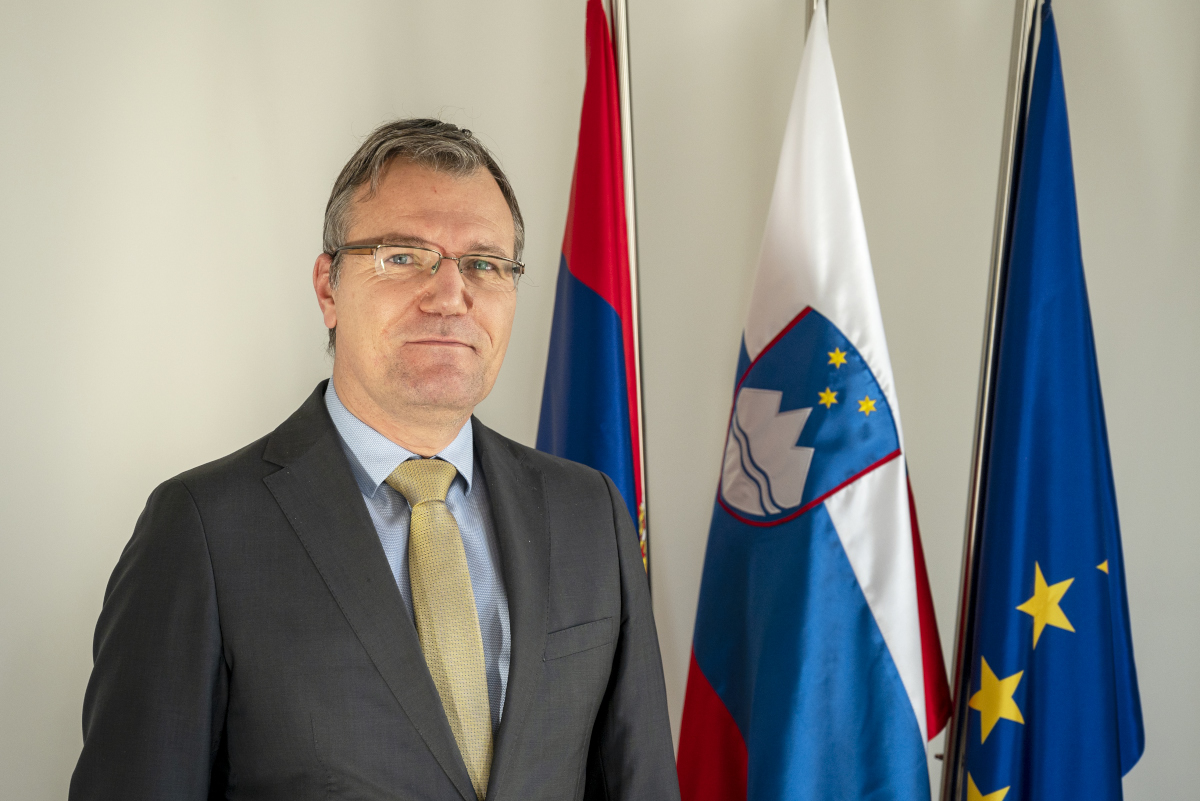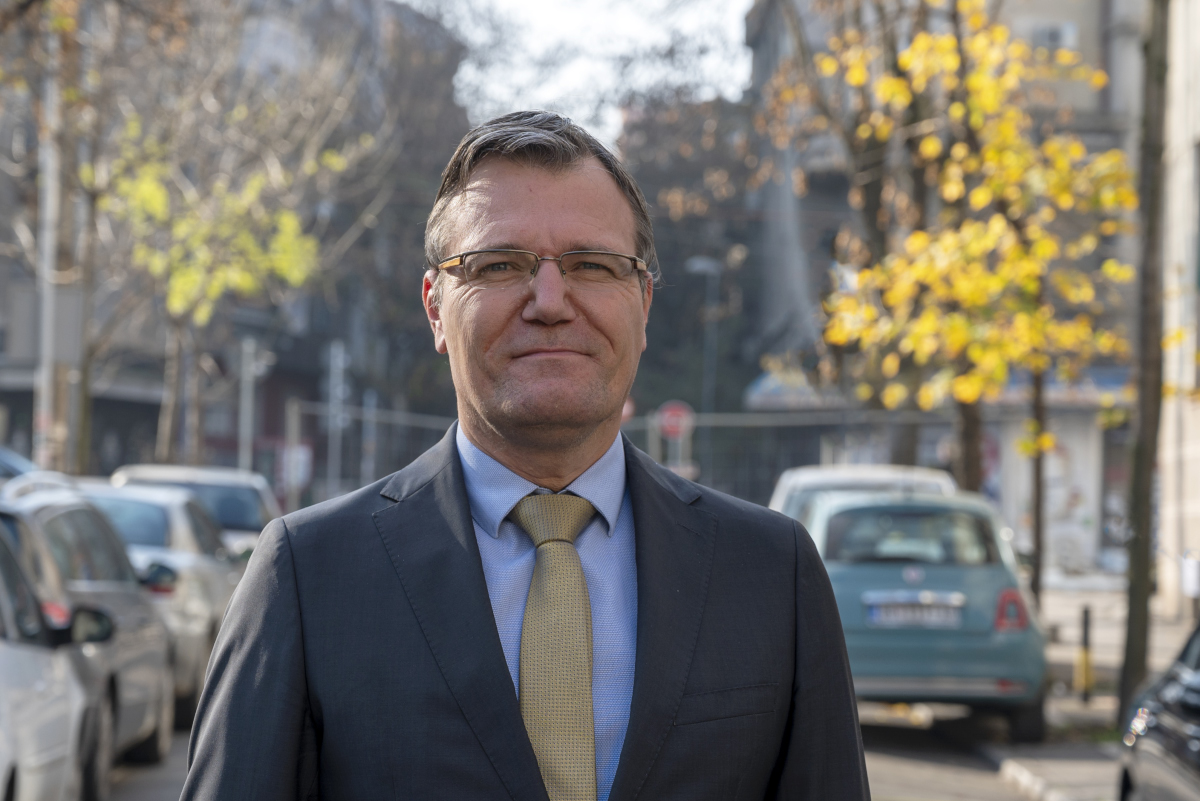Next year, Slovenia will celebrate an important jubilee – 30 years of the country’s independence, and this year, Serbia and Slovenia are celebrating 20 years of excellent diplomatic relations.
In an interview for the special edition Slovenia InFocus, the new Ambassador of Slovenia to Serbia, H.E. Damjan Bergant, speaks about the cooperation between Slovenia and Serbia, the crisis, the upcoming Slovenian presidency of the Council of the European Union, and the consequences of the pandemic in the coming year. “I hope that in June next year, the situation will allow us to celebrate the 30th anniversary of Slovenia’s independence in a dignified manner, as well as the beginning of our EU presidency. We are slowly entering a phase in which we are thinking about how we are going to celebrate it. As Slovenia and Serbia, their overall relations have been consistently good, “adds Mr Bergant.

H.E. Damjan Bergant, Slovenian Ambassador to Serbia
This year marks the 20th anniversary of the establishment of diplomatic relations between our two countries. What challenges did we have to overcome and what marked the two decades of cooperation?
In early December, more precisely on December 9, we will mark the 20th anniversary of the establishment of diplomatic relations between Slovenia and Serbia. The relationship between Slovenes and Serbs has traditionally been very good, even before our respective countries declared independence.
I think that Slovenia and Serbia have achieved a fairly high level of cooperation in all areas in the last 20 years, from political cooperation and economic cooperation to cooperation in culture, science, etc. We know each other and cooperate well at all levels. In short, we understand each other, not only because of the similar languages but also because of several decades of connection.
Regardless, I think there are still reserves and opportunities to boost relations in many areas. As an EU member, Slovenia can continue to help Serbia to move closer to European accession, especially with its experience. I hope that both sides will continue to use the opportunity to improve cooperation.
Economic relations are also excellent. How can the two countries further improve their relations?
Economic investments on either side must not be limited. I think that it is very important that there are additional Slovenian investments in Serbia and vice versa. In this way, both sides can benefit from the global economy and achieve better economic results. Before the COVID-19 crisis, economic results grew year-on-year, which was very good. We expect that the current situation around the pandemic will slightly bring these results down, but I think that the situation will improve after the crisis.
“According to the beneficiaries, the measures for the protection of the economy in Serbia were timely and efficient”
Slovenia will start presiding over the EU in the second half of 2021. What will be the top priorities of your presidency?
Slovenia will take over the presidency of the EU Council on July 1, 2021. This is not the first, but the second presidency. However, this presidency will be different than in 2008. The presiding country no longer has the role it had before the Lisbon Treaty. The role of the presiding country is actually to coordinate the work of the member states. The priorities of the presidency this time have to be in line with the presidency programme of the Trio of countries – Germany, Portugal and Slovenia. They are already being implemented during the German presidency of the EU Council and will continue during the Portuguese presidency.
The biggest problem in terms of priorities is that they are very indicative, because nowadays when you have various challenges from terrorism, pandemics to, migration, it is difficult to formulate them in detail. I certainly hope that the Trio’s priorities will eventually be implemented, especially strengthening the resilience of the EU), economic renewal of the European Union, strengthening the EU based on rule of law and a secure European Union as a reliable and good partner in the neighbourhood and the world.

H.E. Damjan Bergant, Slovenian Ambassador to Serbia
What challenges does Europe in lockdown face and how resilient is the EU to this unprecedented pandemic-induced crisis?
Europe faces many problems. Some of them have been present for a long time, such as terrorism or migration, and some are completely new, such as the coronavirus pandemic.
Europe needs to know how to respond to all the challenges of today. It indeed takes some time for a reaction to happen, but the fact is that answers to all challenges are always found in the end. The EU is an integration that has been in making for decades and it was difficult to reach the current level of integration. In my opinion, the EU will be further strengthened as crises and difficulties are only an additional inspiration for the EU to continue to become stronger. As for the pandemic, I think that it will be just a bad memory in 6 to 12 months and that life will go its own way.
Slovenia supports Serbia on its European accession path. What should be the priorities of the Serbian Government when it comes to the European integration process?
You’re right. Slovenia does support Serbia on its path to the European accession and we hope that Serbia will soon become an EU member. However, this depends mostly on Serbia which needs to have confidence in the EU, the European Commission and the member states, so that it can implement what is best for it. Serbia needs to be actively engaged in all open negotiation chapters to meet the conditions for the chapters to be closed. When Serbia is ready to become a full-fledged EU member, member states and the Commission will jointly support Serbia’s membership in the EU. But everything that Serbia is doing towards becoming an EU member is not doing for the sake of the EU, but for the sake of itself and its citizens. Sometimes it seems that it may be unfair that Serbia has to do more than some other candidates who have become members in the meantime. But I can say that every country felt that during the negotiations. Slovenia also had objections during its accession process.
“Slovenia does support Serbia on its path to the European accession and we hope that Serbia will soon become an EU member”
After all, EU membership is a positive development for every country. The EU is not just reduced to membership, but it entails improvement at all levels of the life of the country and its citizens. No EU member state could make such progress in different areas as it can as an EU member. That is the only alternative and Serbia has that chance to become a member of the EU family.
What do you think of the Government’s measures that are being implemented, both in Serbia and in Slovenia, that assist the economy and businesses?
According to the beneficiaries, the measures for the protection of the economy in Serbia were timely and efficient. Protective measures cost the Serbian government, as well as any other government in the world, a lot, and it is very difficult to determine in uncertain times like these how much budget money should be allocated to businesses and especially to which branch of the economy, without knowing how long the epidemic will last. Eight months have passed since March and the end of the epidemic is not in sight. We are counting peaks, we are waiting for a vaccine and we hope that the health system will withstand this hellish pressure. Unlike Serbia, Slovenia had the opportunity to withdraw some money from the EU to help the economy, and thus the government of Slovenia is in a better position to repeat the protective measures from March. Globally, all countries have borrowed a lot again, while the Slovenian economy was well-prepared for the economic crisis. Ten years ago, the financial crisis affected us all, but with the help of restrictive banks, companies diligently economized their consumption and increased their revenue knowing that they needed to ‘collect more cream’ for the new upcoming crisis.
Tourism is an important sector in Slovenia. What will the recovery look like next year and can you give any forecasts?
Tourism is a very important economic segment in Slovenia, but it is not as strong as tourism in some other countries. Unlike some other countries, our tourism has a 12% share in the national GDP. This year, tourism suffered great damage due to the pandemic, but the government of the Republic of Slovenia has launched a rather successful initiative of the so-called tourist vouchers for the citizens of Slovenia. During the spring, the vouchers were well-accepted and used by citizens and tourist boards. In this way, the tourism sector did not experience a catastrophe. This year, we didn’t have many foreign guests in tourist facilities in Slovenia, but mostly domestic ones. The season was not so bad after all. Unfortunately, no-one knows what the next year will bring, but I remain optimistic and I think that this pandemic-induced crisis will end in 6 months, and we will be able to count on a better season next spring.
Positive impressions
What are your first impressions of life in Belgrade and Serbia?
They are very positive. Serbia is a good host and Belgrade is an extraordinary city. It has everything big cities are supposed to have. People are open and it is not difficult to establish contact. I am glad that the older and younger generations have a positive opinion of Slovenia. I got used to life here very quickly and I already know that it will be difficult for me to return to Slovenia at the end of my term. Maybe there is only one thing that bothers me, which is also a challenge for me. I need to practice my language so much, that people don’t ask me where I come from anymore, or that they don’t ask me after only a few uttered sentences in Serbia whether I come from Slovenia. We’ll speak again in a year and see.